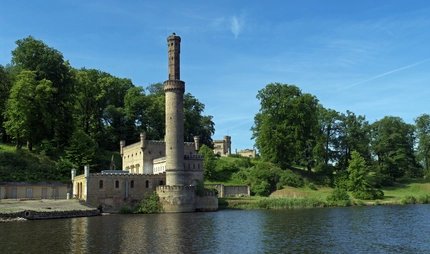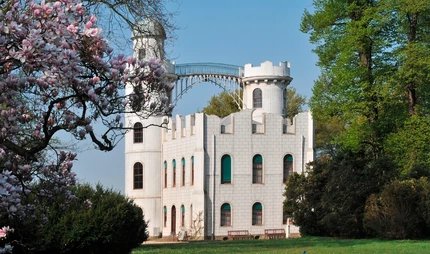
Charlottenburg Palace/ Old Palace
A palace for a queen
Discover the magic of the rococo at the beautiful Charlottenburg Palace – once a royal summer residence, today Berlin’s largest and most magnificent palace.
Sophie Charlotte, the first Queen consort in Prussia, was not only an accomplished musician, playing the harpsichord and singing Italian opera, but also strolled through the grounds here with her friend, the renowned scholar and philosopher Gottfried Wilhelm Leibniz. When Sophie Charlotte died, just 36 years old, the palace and the area around was named Charlottenburg after her. Today, this is the largest and most magnificent palace in Berlin – a highlight for any Berlin visitor.

Charlottenburg Palace – History
Sophie Charlotte of Hanover was the younger sister of George Louis of Hanover, who succeeded to the British throne as George I. In 1684, she married Friedrich III, the Elector of Brandenburg and the then Duke of Prussia. Friedrich gave Sophie Charlotte a large estate and the village of Lietze/Lützow, at that time still outside Berlin, and this was the site of her summer palace. Completed in 1699, it was initially known as Lietzenburg Palace. Sophie Charlotte, a great lover of the arts, invited poets, philosophers, musicians and artists to join her at her “court of the muses”. Even her husband King Friedrich I could only visit if she personally invited him. After her death, Friedrich named the palace and the surrounding area Charlottenburg in her honour.
Sophie Charlotte was not the only Prussian queen to leave her mark on Charlottenburg – so did Queen Louise, who was much revered by the general populace. She died in 1810, and is buried in the mausoleum with her husband, Friedrich Wilhelm III, and her son. In the course of the nineteenth century, Charlottenburg Palace was gradually forgotten by the royal rulers. From 1880, it was no longer classified as a royal residence, and the grounds were opened to the public. In the Second World War, the palace was badly damaged, though it was later rebuilt.
Visiting Charlottenburg Palace
In the Neuer Flügel (New Wing), you can view the staterooms and the rococo ballroom known as the Goldene Galerie (Golden Gallery). The Silver Vault includes quite stunning tableware of gold, silver, glass and porcelain displayed on laid tables. Around 100 table services have survived intact, a vivid reminder of the magnificence of dining at court. The impressive display of the remaining pieces of the Prussian crown jewels, complete with the imperial insignias, as well as personal treasures, such as the elaborated designed, exquisite snuffboxes collected by Friedrich the Great, are also well worth seeing. The Porcelain Cabinet in the Old Palace - re-opened on 1st October, 2017 - offers a breathtaking collection of the finest blue-and-white porcelain decorating the entire room.

Charlottenburg Palace Park
Once Sophie Charlotte strolled through the park, celebrated lavish festivities here and enjoyed these magnificent baroque gardens. The park and grounds were designed by French landscape architect Siméon Godeau, a pupil of André le Nôtre, principal gardener of Louis XIV of France at Versailles – the model emulated by all court gardens across Europe in the baroque era. But the fashions in landscaping changed down the years, and Sophie Charlotte’s successors re-designed the grounds in the fashion of their day – as an English-style landscaped park. The highlights in the park are the mausoleum, the Belvedere tea house and the Neuer Pavillon, a small neo-classical house modelled on a Neapolitan villa.
Use our Day Ticket Charlottenburg+ for Charlottenburg Palace and all facilities in the Charlottenburg Palace Gardens.

The Mausoleum
Queen Louise was much loved by her subjects – and much mourned when she died in 1810, aged just 34. For the “queen of hearts” of her day, King Friedrich Wilhelm III, her husband, had a mausoleum resembling a classical temple constructed in the park. He also commissioned leading German figure sculptor Christian Daniel Rauch to carve an impressive funerary sculpture of Louise to decorate her sarcophagus. Friedrich Wilhelm married again, some fourteen years later, but since his second wife came from a low-ranking noble family, she was kept more or less removed from court life. When she died in 1873, she was buried in the closed crypt in the mausoleum under the anteroom, without a commemorative memorial and not even a memorial tablet.
The Belvedere Tea House
The entire Belvedere tea house with its view of the River Spree is actually a treasure trove of exquisite porcelain, and houses the largest collection of porcelain from the world-famous KPM porcelain producers – the Königlichen Porzellan-Manufaktur Berlin.
Belvedere
The former tea house and panoramic pavillon, built in 1788, houses an exquisite collection of porcelain objects.
A Palace Garden Café is romantically located in the small Orangery.
Look to the sky
On the dome of the palace, a golden figure of the goddess Fortuna is balancing on a sphere. She carries an outstretched cloak, making her rotate in the wind. This gilded statue dates from the twentieth century, but was inspired by the original weather vane from 1711.
Charlottenburg Palace – Events
Concerts in the Orangery
A festive evening with a gala dinner and superb concert with the Berliner Residenz Orchester in the former Orangery. Dressed in elaborate baroque costumes and wigs, the orchestra and singers perform much-loved pieces of classical music.

Children’s birthday parties in Charlottenburg Palace
A real treat for young princes and princesses! Made up and dressed in impressive costumes, the children become the ladies and gentlemen of the court, dancing a minuet to the sounds of the Berliner Residenz Orchester.
Charlottenburg Palace Christmas Market
In the Advent season, the palace provides an atmospheric setting for a relaxed Christmas market with stalls selling arts and crafts and traditional festive treats.
Information for school classes
School classes are granted 30% off the standard group price. The Prussian Palaces and Gardens Foundation Berlin-Brandenburg offer special tours for school classes to visit such as, for example, the Museum Workshop in Potsdam. The themed tours are specifically designed for different age groups.
Museums in the vicinity of Charlottenburg Palace
The Käthe Kollwitz Museum has been located in the theatre building at Charlottenbau Palace since autumn 2022.
You can also visit the following museums, the first three of which are directly opposite the palace:
- Bröhan-Museum
- Museum Berggruen
- Sammlung Scharf-Gerstenberg
- Charlottenburg-Wilmersdorf Museum in the Oppenheim Villa
- Keramik-Museum Berlin – Ceramics Museum
- Staatliche Museen’s Replica Workshop (Gipsformerei)
See and save with the charlottenburg+ ticket
Visit all the museums and sites in the palace grounds (Charlottenburg Palace, New Pavilion, Belvedere, Mausoleum) with just one ticket: charlottenburg+.
Opening Hours
Winter season | November to March
Valid: 01.11.2024 - 31.03.2025
Monday: closed
Tuesday - Sunday: 10:00 - 16:30
Christmas Eve (24.12.2024)
Closed on
1st Christmas Day (25.12.2024)
Closed on
2nd Christmas Day (26.12.2024)
10.00 - 16.30
New Year's Eve (31/12/2024)
10.00 - 14.00 hrs
New Year's Day (01/01/2025)
11.00 a.m. - 4.30 p.m.



